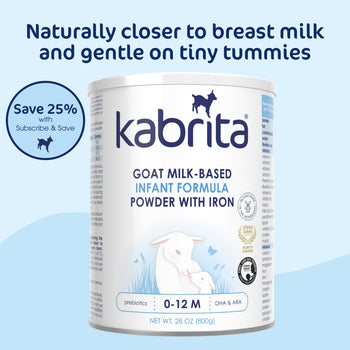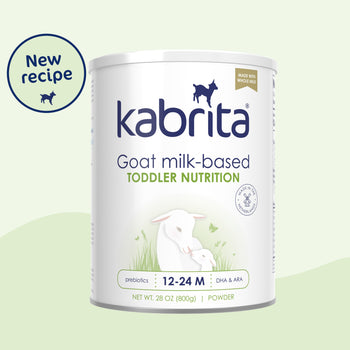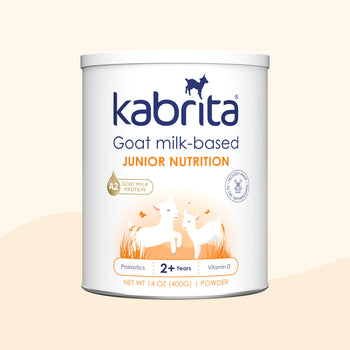Diet and Functional Digestive Issues in Pediatric Patients

Information for Health Professionals
Digestive discomforts such as reflux, gas & bloating, diarrhea and constipation are some of the most common GI related concerns in pediatric health care.[1] These symptoms can have various underlying causes, including dietary triggers. Read on to learn how cow’s milk may contribute to functional GI issues in some children.
Delayed Digestion and Reflux
Recent research suggests that the longer food stays in the stomach, the more likely reflux may occur.[2] Digested milk proteins form curds, and the quality of these curds impact how readily milk moves through the digestive tract.
Cow’s milk, for example, contains a higher amount of alpha-s1 casein compared to goat’s milk. Alpha-s1 casein has been shown to have an effect on the size and tension of the curds formed in the gut; creating larger and denser curds. In contrast, less alpha-s1 casein, as is found in goat milk, contributes to the formation of smaller, softer, looser curds in the gut, which may be digested more quickly. [3]

Diet and Functional Constipation
Up to 30% of children experience constipation, with the majority of cases being functional. Children may experience constipation for a variety of reasons: a new developmental stage such as toilet training, travel or temporary illness are just a few examples. In some cases, however, functional constipation may be associated with a dietary trigger. Some studies suggest that cow’s milk may cause constipation in some children.[4][5] Similarly, the American Academy of Family Physicians supports a cow-milk free trial in some cases of unresolved constipation.[6]
Slow Transit and Gas
Excessive gas and bloating may be associated with a distended tummy, abdominal pain, excess flatulence, burping and constipation. There are many causes of gas and bloating including motility disorders, carbohydrate intolerances or simply swallowing too much air. Constipation, for example, may be a trigger for gas and bloating as longer transit times may allow for increased fermentation of short-chain carbohydrates in the gut, causing gas, bloating and discomfort.[7]
Inflammation and Diarrhea
Cow’s milk may also contribute to looser stool in some children. Studies support, for example, that the elimination of cow milk protein often helps resolve inflammation and motility issues altogether. [8] Though more research is warranted, it’s possible that early and sustained release of inflammatory mediators released in response to the consumption of cow’s milk may lead to dysmotility and hypersensitivity that present in the form of either loose or hard stools.[9]
Explore Dietary Triggers in Pediatric Patients
If your pediatric patient is struggling with functional GI issues and no other causes are found, consider exploring possible dietary triggers including cow milk. Asking patients to keep a diet diary, or eliminating cow milk-based foods for 2-4 weeks may help identify an association between symptoms and food triggers.
For those children with mild issues associated with cow milk consumption, Kabrita Goat Milk Toddler Formula may be a nutritionally suitable alternative. Kabrita contains naturally easy to digest goat milk protein, and is safely fortified with 25 vitamins and minerals.
[1] Iacono, G., et al., Gastrointestinal symptoms in infancy: a population-based prospective study. Dig Liver Dis, 2005. 37(6): p. 432-8.
[2] Argon, M., Duygun, U., Daglioz, G., Omür, O., Demir, E., & Aydogdu, S. (2006). Relationship between gastric emptying and gastroesophageal reflux in infants and children. Clinical nuclear medicine, 31(5), 262–265. https://doi.org/10.1097/01.rlu.0000210500.64440.76
[3] Park YW. Hypo-allergenic and therapeutic significance of goat milk. Small Rumin. Res. 1994;14,151–161
[4] Iacono, G., Cavataio, F., Montalto, G., Florena, A., Tumminello, M., Soresi, M., Notarbartolo, A., & Carroccio, A. (1998). Intolerance of cow's milk and chronic constipation in children. The New England journal of medicine, 339(16), 1100–1104. https://doi.org/10.1056/NEJM199810153391602
[5] Dehghani, S. M., Ahmadpour, B., Haghighat, M., Kashef, S., Imanieh, M. H., & Soleimani, M. (2012). The Role of Cow's Milk Allergy in Pediatric Chronic Constipation: A Randomized Clinical Trial. Iranian journal of pediatrics, 22(4), 468–474.
[6] Biggs WS, Dery WH. Evaluation and treatment of constipation in infants and children. Am Fam Physician. 2006;73(3):469-477.
[7] Brooke-Taylor, S., Dwyer, K., Woodford, K., & Kost, N. (2017). Systematic Review of the Gastrointestinal Effects of A1 Compared with A2 β-Casein. Advances in nutrition (Bethesda, Md.), 8(5), 739–748. https://doi.org/10.3945/an.116.013953
[8] Borrelli, O., Barbara, G., Di Nardo, G., Cremon, C., Lucarelli, S., Frediani, T., Paganelli, M., De Giorgio, R., Stanghellini, V., & Cucchiara, S. (2009). Neuroimmune interaction and anorectal motility in children with food allergy-related chronic constipation. The American journal of gastroenterology, 104(2), 454–463. https://doi.org/10.1038/ajg.2008.109
[9] Shulman, R. J., Eakin, M. N., Czyzewski, D. I., Jarrett, M., & Ou, C. N. (2008). Increased gastrointestinal permeability and gut inflammation in children with functional abdominal pain and irritable bowel syndrome. The Journal of pediatrics, 153(5), 646–650. https://doi.org/10.1016/j.jpeds.2008.04.062



